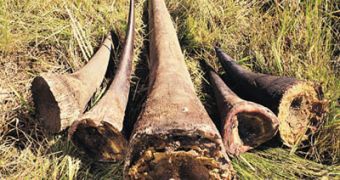Although it is very much true that some people are willing to risk their lives in order to keep endangered species such as rhinos and elephants safe from poachers, it appears that certain wildlife rangers agree to be given money by poachers in exchange for their not doing anything to protect the animals they are supposed to be looking after.
Conservationists now warn that, as a result of corruption's being on the rise amongst wildlife rangers, plans to end poaching and keep several animal species from becoming extinct are bound to end in failure.
Mongabay informs us that, throughout the past few years, rhino horns and elephant tusks have become quite expensive, meaning that the people who sell them are unlikely to experience any money shortages.
On the other hand, the wages that wildlife rangers get have pretty much remained the same, which is why it need not come as a surprise that some of them are ready and willing to accept bribery in order to make ends meet and support their families.
By the looks of it, the wildlife rangers living and working in Tanzania and Cambodia are the ones more often bribed by gangs of poachers.
The same source quotes Sean Willmore, the current president of the Australian-based International Ranger Federation, who wished to make the following observations: “There's more money floating around now from the poachers, so it's more of a problem than ever before.”
“It's as bad as I've known it. If rangers aren't getting enough remuneration, they can be corrupted. In Cambodia, for example, rangers were being paid $100 (€78) a month and that was cut to $30 (€23.4) a month by the government. What do you do if you want to feed your family?” Sean Willmore went on to add.
Conservationists now say that, in order for poaching to be put an end to, high officials have to make sure both that the wildlife rangers in charge of looking after the animals living in national parks are properly paid for their services, and that only trustworthy people get hired as rangers.

 14 DAY TRIAL //
14 DAY TRIAL //